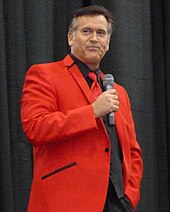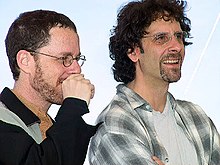Crimewave
Crimewave is a 1985 American comedy film directed by Sam Raimi, from a screenplay he co-wrote with the Coen brothers.
It stars Reed Birney, Sheree J. Wilson, Paul L. Smith, Brion James, Louise Lasser and Bruce Campbell, with the latter also serving as a co-producer.
An unusual slapstick mix of film noir, black comedy, Hitchcockian suspense,[4] and B-movie conventions, Crimewave portrays bizarre situations involving a nebbish everyman (Birney) entangled in a murderous plot while pursuing his love interest (Wilson).
Several story and style elements found in Crimewave influenced later productions by Raimi, and its overall failure directly led to the inception of Evil Dead II (1987).
Trend, co-owner of the company, has learned of a plan by his partner to sell the company to Renaldo "The Heel" (which stole Nancy and bullied Victor by beating him up and calling him a loser) and responds by hiring two exterminators who promise to "kill all sizes" in order to eliminate Odegard and his plan.
Trend, run afoul of the killers, and a seemingly random series of slapstick murders occur, for all of which Victor is ultimately blamed.
[12][13] Joel Coen's experience editing The Evil Dead inspired him to complete his own film, Blood Simple, which was released to critical acclaim.
"[11] After reading the Blood Simple script, however, Campbell commented that the screenplay was "great", comparing it to the work of Alfred Hitchcock.
[11] It featured "mild-mannered leading men" who "get caught up in a web of fear, murder and mayhem", elements that often defined the films directed by Hitchcock.
[2] Raimi and Campbell developed the project with Embassy Pictures' producer Norman Lear, who supposedly had a "Midas touch", because of the consistent success he had attained from various television productions.
[19] The first disagreement between the director and the executives stemmed from the latter's insistence on casting a "Hollywood" actor in the lead role instead of Raimi's long-time collaborator and friend Campbell.
[6] In his 2002 autobiography If Chins Could Kill: Confessions of a B Movie Actor, Campbell commented about how difficult it was working with more established producers; "jumping into the big time meant dealing with the excruciatingly specific and alternately vague demands of a studio, ... Hollywood executives took an interest in everything.
[2] Campbell and his photographer friend Mike Ditz used a 16 mm film camera and shot a scene to show to the producers.
[20] At that point, the studio stepped in, with executives demanding cuts in the script, budget restrictions, layoffs, and their own supervision of the project.
[21] The studio also insisted on reviewing every batch of dailies, criticizing the decision to use cast and crew members (including Campbell) as extras in several scenes (a Raimi trademark known as "Shemping").
[20] Production was often affected by "weird" events; actor Brion James trashed his hotel room in an attempt to "exorcise a ghost from his light fixtures".
[23] At another time, the crew spent a week filming on a Detroit street after dark, directly under a nursing home, with huge wind machines blowing for long hours.
[25] Campbell argued that he and Raimi had always been closely involved with their own films' editing, describing the behavior of the producers as "nickel-and-dime-bullshit".
[25] The difficulty during production left a negative impression on Campbell, who insisted that he never wanted to work with big-budget movie producers again, describing the conduct as "soulless" and "just a business.
[27] To make matters even more confusing, in France and Italy, the film's title was changed to Death on the Grill and The Two Craziest Killers in the World respectively.
A writer for Time Out gave a negative review, writing "despite its ambition and a Coen Brothers script credit, Raimi's second film was a disappointment after his astonishing debut The Evil Dead."
[28] Film Junk writer Sean Harley commented that if the same filmmakers had released a movie today, "based on their impressive filmographies and the cult followings that both have amassed, a collaboration of this magnitude would be a cinematic event like no other."
"[30] Celluloid Dream's Simon Hill commented that the writing was a disappointment, musing that it did however feature "glimpses of the director" Raimi would become.
[38][39] John Cameron, second assistant director on the film, remarked, "I see Crimewave as a real turning point in a certain way, because if you survived that experience, nothing in the business could ever be as hard again.
[24][42][43] In 2010, a Funny or Die comedy video featuring actors James Franco and Bill Hader paid tribute to Raimi.



